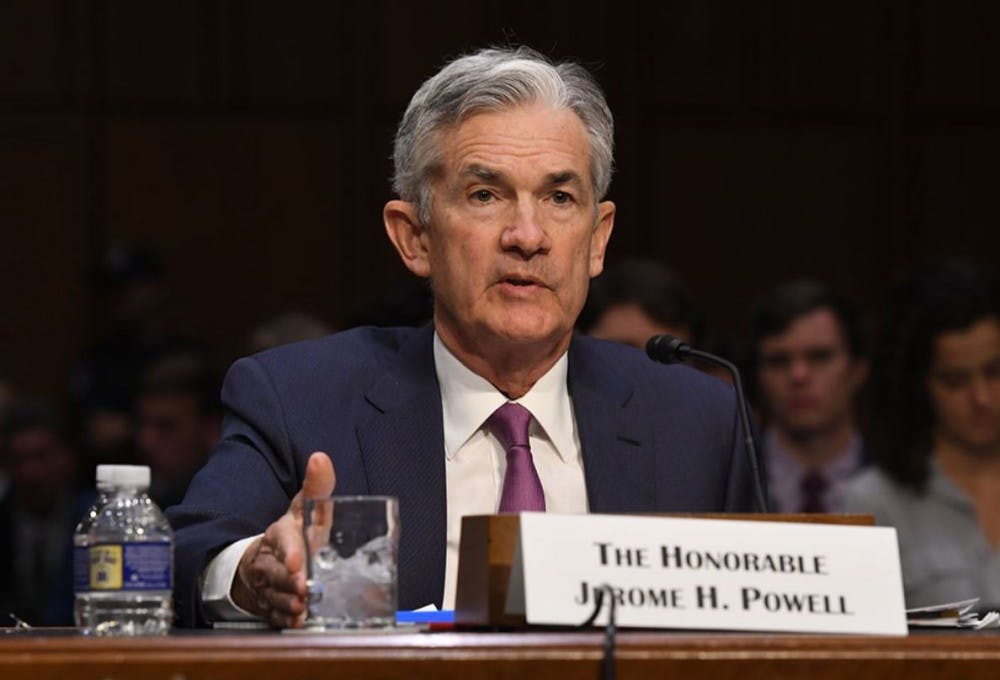Federal Reserve chair Jerome Powell ’75 has recently found himself embroiled in a controversy surrounding federal interest rates with President Donald Trump. The two men have sparred pointedly on the topic, largely differing in their approaches to sustaining growth in an economy that is strong but not immune to a slowdown in 2019.
Powell, who has had experience in private law, banking, and the Treasury Department, has demonstrated a more cautious approach to monetary policy. Powell has repeatedly acknowledged the promising trend of economic growth in the United States over the past few years but has also warned of some negative signs, particularly from abroad.
At a press conference on Jan. 30, Powell pointed to “cross-currents” and “conflicting signals” in China and Europe, issues that may have arisen in the wake of Brexit and the partial government shutdown in the United States.
Powell’s urge for a “patient, wait-and-see” approach to monetary policy is at odds with the President’s hastier plan of action. The Fed’s decision on Dec. 19 to raise interest rates for the fourth time last year, this time from 2.25 to 2.5 percent, drew sharp criticism from the president.
The federal interest rate plays a significant role in the growth of an economy. While lowering interest rates can spark more spending and risk-taking, a decision to increase the rate could suggest that the economy is growing too fast, leading to dangerous levels of inflation.
President Trump, who has lauded recent job growth and unemployment numbers, has expressed strong confidence in the U.S. economy and advocated for lower interest rates to keep it growing. He has called rate increases “foolish” and has asserted that the Fed has gone “crazy.”
He has also repeatedly tweeted out his frustration with the central bank, exhorting the Federal Reserve to “feel the market” instead of going by “meaningless numbers.”
On Nov. 27, the president told The Washington Post in an interview that he was “not even a little bit happy” with his selection of Powell.
Bloomberg reported on Dec. 21 that Trump was considering firing Powell over their disagreement.
Economics professor and former Federal Reserve vice-chairman Alan Blinder ’67 told The Daily Princetonian that the controversy between the two men stems from a more fundamental difference between them.
“Powell thinks before he speaks, and Trump speaks before he thinks,” Blinder said. The famed economist defended Powell’s decision-making and told the ‘Prince’ that “Trump’s approach goes against what almost all economists would think is sound behavior.”
“The Fed has been, for years and years, pressing firmly on the accelerator to get the economy moving, and all Powell has done so far is remove the foot from the accelerator,” Blinder said. “It still is on the accelerator, but lightly.”

“Trump wants the economy to roar,” Blinder said. “But you don’t want it growing too fast.”
In addition, Blinder cited the below 4 percent unemployment figure that Trump has boasted about. In a society with “high resource utilization such as ours,” uncontrolled economic growth can lead to inflation, he warned.
Blinder also noted that Trump’s background in real estate may be a major driver of his position.
“Real estate developers always want interest rates to be low, since they are heavy borrowers,” Blinder noted.
The president’s forceful stance on the issue has raised numerous questions pertaining to the Federal Reserve’s autonomy.
“Presidents since Bill Clinton have understood and respected the independence of the Fed,” Blinder emphasized. “And even if they privately fumed about the Fed raising interest rates, as I saw Bill Clinton do, they didn’t go public with it. They respected the independence of the Fed.”
Though presidents appoint members to the Federal Reserve, it tends to make decisions without input from the president, current political battles, or other agencies. For this reason, Blinder believes that it is probably the most independent federal department.
Powell’s rhetoric surrounding this point confirms the Federal Reserve’s independence.
“We are absolutely committed to serving the public in a nonpartisan, professional way, in a way that communicates what we’re doing, why we’re doing it, as clearly as possible," Powell said at a Dallas Federal Reserve event in November.
Powell has emphasized that this independence will allow the Federal Reserve to fill its singular goal: “to sustain the economic expansion, with a strong job market and stable prices, for the benefit of the American people,” as he outlined in the Jan. 30 press conference.
Jerome Powell did not respond to request for comment from the ‘Prince’ by the time of publication.








